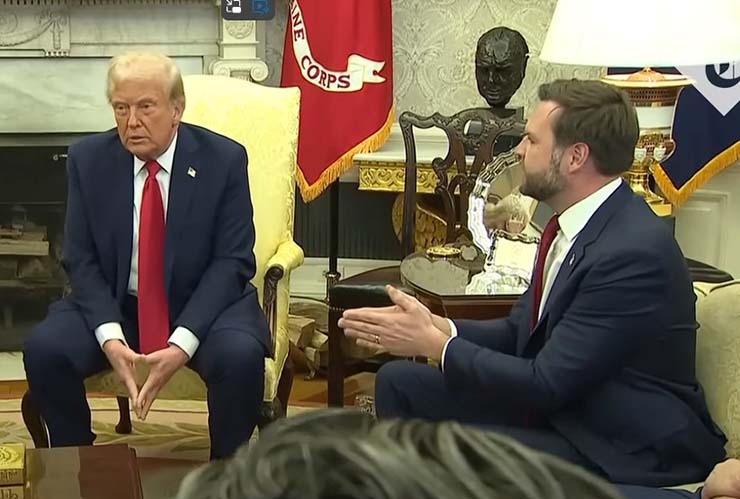I keep seeing unfavorable comparisons of Trump to Churchill. I don’t understand those. What Trump’s critics accuse him of doing to Ukraine would not be a betrayal of Churchill’s legacy; it would be its recapitulation. Churchill clearly believed that Russia should be able to do what it wanted with its Slavic neighbors.
As I wrote in “A World Safe for Stalinism” for Chronicles in February 2007:
Long ago, a British veteran of World War II offered this sober moral judgment on the war:
It was just such a sunny, breezy Mediterranean day two years before when he read of the Russo-German alliance, when a decade of shame seemed to be ending in light and reason, when the enemy was plain in view, huge and hateful, all disguise cast off; the modern age in arms.
Now that hallucination was dissolved, like the whales and turtles on the voyage from Crete, and he was back after less than two years’ pilgrimage in a Holy Land of illusion in the old ambiguous world, where priests were spies and gallant friends proved traitors and his country was led blundering into dishonour.
The occasion for the disillusionment of the hero of Evelyn Waugh’s masterful World War II trilogy (The Sword of Honor) was, of course, news of the the alliance between Great Britain and the Soviet Union…
The betrayal of Poland began in earnest in April 1943, when the Soviets broke diplomatic relations with the Polish government in exile in London because the Poles had called for an investigation of the murder of thousands of officers in the Katyn Forest. Stalin wrote to Roosevelt that this was “absolutely abnormal and contrary to all rules and standards governing relations between allied countries” and “a vile fascist slander.” FDR reassured Stalin that the call for an investigation of Katyn was a “stupid mistake” and that “Churchill will find ways … of getting the Polish Government … to act with more common sense.” (Of course, we now know what the Poles merely suspected in 1943: The thousands butchered at Katyn were killed by the Soviets, not the Nazis.)
The plot thickened at the Tehran Conference, where Roosevelt and Churchill essentially agreed to allow Stalin to keep the eastern part of Poland he had seized in 1939, without bothering to inform the Poles of this secret arrangement. Churchill told The New York Times that Tehran marked a “melding of minds, a union of spirit.” Who needed the Poles when you had Uncle Joe in your corner?
After Tehran, the Poles could not expect even lip service from Roosevelt or Churchill. In March 1944, Churchill threatened to tell Parliament that, in view of the disagreements between Stalin and the Polish government, all questions of territorial change must await a postwar armistice; until then, Britain could recognize no forcible transfer of territory. Stalin responded by threatening that “if you make such a speech I shall consider that you have committed an act of injustice and unfriendliness toward the Soviet Union.” Churchill meekly deleted the offending portions of his speech; after Yalta, he actually defended just such a forcible transfer of territory in Parliament, telling the House of Commons that “I know of no government which stands to its obligations … more solidly than the Russian Soviet government.”
Those who view Churchill as an unblemished hero should carefully consider those words, spoken by the prime minister not only in the knowledge that he was lying but knowing that his brave words of defiance to the Nazis in 1939 and 1940 had been paid for, in part, with Polish blood, both in resistance to the Nazi invasion in 1939 and in the defense of Great Britain.
In the crucial days of September and October 1940, Polish pilots constituted between an eighth and a quarter of the pilots available to Fighter Command for the defense of London and accounted for 18 percent of German planes destroyed on September 11, 14 percent on September 15, 25 percent on September 19, and 48 percent of all German planes destroyed on September 26. As Air Chief Marshall Dow-ding admitted after the Battle of Britain, “had it not been for the magnificent material contributed by the Polish squadrons and their unsurpassed gallantry I hesitate to say that the outcome of the battle would have been the same.” For this “unsurpassed gallantry,” the Poles received at Yalta what the Czechs had received at Munich—the subjugation of their country—with one difference: This time, Churchill defended the betrayal in Parliament.

Leave a Reply